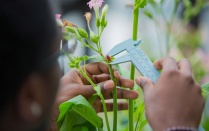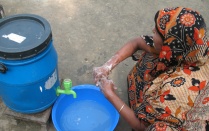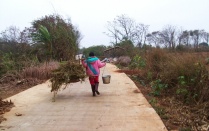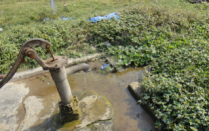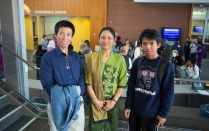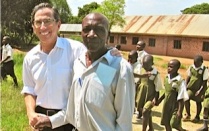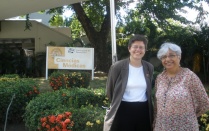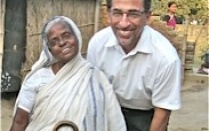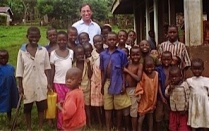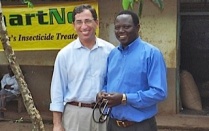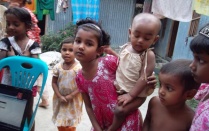campus news
PT student aims to reverse health stigma in Buffalo neighborhood

Sirawar Matin works out on some physical therapy equipment at Jericho Road Community Health Center, where he worked during one of his PT rotations. Photo: Meredith Forrest Kulwicki
By CHARLES ANZALONE
Published March 8, 2024
UB physical therapy student Sirawar Matin asks to meet for this interview at the Broadway Market on Buffalo’s East Side. It’s morning, still weeks away from Easter when the energy there ramps up. But Matin is not deterred. This is his neighborhood, the location of his vision, and despite the sleepy market mood, he’s clearly excited to be in the midst of that “enormous potential.”
Matin, still only 25, will graduate this May with a doctorate, a world of plans and the qualities that could very well lead him to becoming part of Buffalo’s new generation of leaders — a leader concerned about underserved populations, with an immigrant’s consciousness of life’s hardship along with the unmistakable recognition of opportunity.
A Prentice Family Foundation scholar and a 2023-24 Western New York Prosperity Fellow, Matin is an entrepreneur and startup enthusiast who is building business connections throughout Buffalo’s socio-economic strata, with roots that come from living with his disabled parents, who he encouraged to relocate to Buffalo from New Jersey in 2019.
The family’s Lovejoy house is a 20-minute walk away. Matin is in a clinical rotation at the Jericho Road Community Health Center adjacent to the Broadway Market. And two blocks north of the market on Stanislaus Street between two mosques is a 10,000-square-foot plot of land that he owns — thanks to his family’s faith and commitment.
This is where he plans to build his physical therapy practice to address a dire need for those who need treatment but are unfamiliar with it or frightened to get it. It would add a vibrant marker to a revived East Side aimed at a growing and underserved Southeastern Asian population, the same population that shares the challenges and potential of his Bangladeshi family.
“My focus is to make physical therapy accessible, especially for people on Buffalo’s East Side, who tend to be on the lower end of the socioeconomic spectrum,” says Matin.

Sirawar Matin stretches the leg of Navid Siddiqui, a UB alumnus and a physical therapist at Jericho Road Community Health Center. Photo: Meredith Forrest Kulwicki
The magic of PT
Physical therapy is often considered a luxury, Matin explains. “A lot of insurances don’t cover it, especially if you are on Medicaid. There aren’t any physical therapy facilities on the East Side, except for ECMC (Erie County Medical Center) and at Jericho Road.
“Those are populations in unique locations. So I’d like to make this more accessible to the public here.”
Matin has been called a “sparkplug,” someone with “bubbling enthusiasm.” Sitting in the slowly stirring Broadway Market, he conveys a kindness and quiet confidence that’s as contagious as it is reassuring.
“Yeah, 100%,” he answers when asked about the benefits of physical therapy and his other aspirations.
“Time and time again research shows physical therapy improves outcomes across all life spans, whether you are post-op or don’t need surgery,” he says. “And it’s not accessible to the public here. I don’t think the public on the East Side generally knows the benefits of physical therapy.
“It comes down to lack of representation,” he explains. “Eighty to 85% of all physical therapists are white. If you don’t see someone like you in that field, you are less likely to approach that. In Southeastern Asian cultures in particular, therapy is a covert topic. Southeastern Asian people are stoic. Anytime they hear the word ‘therapy,’ they get kind of nervous. But physical therapy is to help the public. It’s movement therapy. I’m just trying to break the stigma.”
There’s more to Matin’s blend of talents and qualities. He wants to tap into what he recognizes as this Buffalo nexus of people willing to help, the vibrant and affordable startup scene and a growing Southeastern Asian population as capable and resourceful as they are in need.
That will all come together “100%” in Matin’s vacant plot vision, the history of which illustrates where he is in his life right now as well as anything.
“I always wanted to build my own practice. My mom knew this, right?” Matin says, enjoying telling this story again.
Gift from a dowry
“So when I first moved to Buffalo around 2020, the peak of the pandemic, I casually browsed Zillow because who doesn’t. I saw that plot for sale, and I said ‘Oh wait. I know exactly where that is.’ I drove up, and it’s a corner lot. Corner lots are more valuable. It’s literally right between the two mosques and a walkable distance from the Broadway Market. And I was just telling my Mom, ‘OMG, this would be the perfect place to build my clinic because it’s the ideal location.’ It’s exactly the community I want to target.
“It was $30,000, and I was like, it was fun to talk about. Let’s move on. Then a couple days go by. My mom says she has a piece of land in Bangladesh she got as part her dowry when she married my dad. Long story, right. So she had a plot of land. She sold that land and put in an offer on this piece of land. She sold her land back home for about $25,000 and we came up with the rest. I put an offer on this land without ever having the money yet. But I was like, ‘OK, let’s set the closing date a month out,’ and within that month, she can sell the land back home and I can have that money.
“So that’s the story of how I got that land.”
“This is my gift to you,” his mother told him.
“Why would you do that?” Matin asked his mother.
“You are taking care of us. This is the least we can do.”
“So any blessings I have in my life,” he says, “it’s because of my parents.”
We want to hear about what you are doing in the field of global health. UB faculty, staff, and students, please send us articles highlighting your work!
